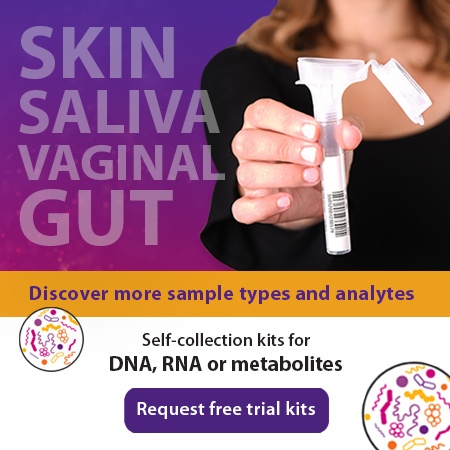2015-03-25
In our previous blog post, we examined the importance of preserving the microbial profile of fecal samples for microbiome analysis. But how do we ensure the sample collection method is reliable enough to attain an excellent profile? And, what are the challenges to getting a reliable sample? Let’s have a look.
Challenges to getting a reliable sample
We often hear of the term “gold standard” which values the “fresh is best” motto for virtually all samples, including a fecal microbiome sample. When conducting microbiome research, how realistic is it to always have fresh samples? Is it feasible to expect donors to travel to a lab at a pre-set time to give a stool sample? Unlike other samples, for example blood and saliva, fecal samples are not always readily available from the donors. Asking donors to provide their sample to the laboratory right after collection can be inconvenient; donors may not feel comfortable collecting their fecal sample in a communal location; they might prefer the privacy of their own homes. Furthermore, it’s not realistic to schedule a collection time for donors to complete at the clinic and/or lab. This would require a lot of time for the donor to travel and be at the collection point.
When you can’t get fresh samples, the most commonly used approach has been to immediately freeze the sample at the point of collection, transport it on dry ice and then store at the lab at -80°C[i]. This approach, however, is not a realistic solution for stool samples, “which may be collected at home and then stored for an indeterminate time in home freezers”[ii]. Ott, S.J et al.[iii] add to this by saying, for hygienic reasons, donors may not feel comfortable storing fecal samples in their home refrigerators or freezers.
Due to the perceived “ick factor”, recruitment of donors willing to participate in a fecal sample collection can be challenging. Asking individuals to put fecal sample in their home freezer can be a major obstacle for participation. The logistics and cost involved in shipping a frozen sample to the lab is also a barrier. Some collections require complicated logistics for the donor, such as packing the sample in styrofoam boxes with ice packs, and arranging shipping with a special transport company at pre-set hours.
If donors were able to collect a fecal sample at home then store the sample at an ambient temperature, it would greatly simplify the collection process, and possibly facilitate donor recruitment. Fecal sample collection will always be more challenging than for other types of samples given that pre-determined timing is not possible. Therefore, emphasis should be placed on making the process as easy, intuitive and safe for the donor as possible. By easily self-collecting and storing the sample at an ambient temperature, the donor can provide the sample in the comfort of their own home. In addition, think of the added value of eliminating the freezing process for the labs. Labs would save on shipping costs by eliminating special carriers, and processing would be that much easier because researchers wouldn’t have to manipulate frozen samples.
Before freezing, or not freezing, comes into contention, the sample must be collected. Simple and standardized kit collection with clear instructions for use would minimize variability amongst different donors’ samples. Instructions that are open to interpretation leave room for variability in sample collection and should be avoided. OMNIgene•GUT, for example, offers a standard liquid volumetric device where donors can easily provide a sample which ensures a consistent amount of fecal matter is collected each time. The liquefaction feature of the device eliminates the manual labour involved with homogenization and aliquoting of frozen samples at the lab and enables automation.
Having reliable self-collection allows for a standardized fecal sample input, meaning researchers are getting a consistent sample, and extracting high yield DNA and concentration from the biospecimen. Having a reliable sample collection method will also enable extractions that are highly reproducible and have a high molecular weight DNA. All of this gives researchers the confidence in knowing that all the samples arriving to the lab are representative of the in vivo state, thus allowing for reliable outcomes on the downstream applications.
So next time you are looking to execute a study involving fecal sample types, keep these things in mind:
Challenges in the collection process |
What to look for in a sample collection device |
|
Donor safety |
Self-collection with non-toxic buffer |
|
Inconsistent amount of stool collected |
Volumetric device |
|
Expense of temperature controlled shipping |
Ambient temperature stability |
|
Manual labour associated with homogenization & aliquoting of frozen or desiccated stool samples |
Standardized liquid samples are automation-friendly |
|
Analytical bias introduced by variable overgrowth and degradation of microbial nucleic acids between collection and processing |
Microbiome profiles stabilized in device which accurately represents the in vivo state at time of collection |

References
[i] Consortium, 2012a cited in Goodrich et al., Conducting a Microbiome Study. Cell. 158, July 17, 2014 p.253.
[ii] Goodrich et al., Conducting a Microbiome Study. Cell. 158, July 17, 2014 p.253.
[iii] Ott, S.J et al., In vitro alterations of intestinal bacterial microbiota in fecal samples during storage. Diagnostic Microbiology and Infectious Disease. August 18 2004.

